Ap world history terms - Study guides, Class notes & Summaries
Looking for the best study guides, study notes and summaries about Ap world history terms? On this page you'll find 138 study documents about Ap world history terms.
All 138 results
Sort by
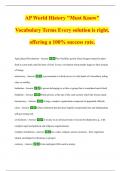
-
AP World History "Must Know" Vocabulary Terms Every solution is right, offering a 100% success rate.
- Exam (elaborations) • 27 pages • 2024
-
- $11.89
- + learn more
Agricultural Revolutions - Answer The Neolithic period when foragers started to plant food to come back and find tons of food. It was a revolution when people began to farm instead of forage. aristocracy - Answer A government in which power is in the hands of a hereditary ruling class or nobility barbarian - Answer A person belonging to a tribe or group that is considered uncivilized brahmins - Answer Hindu priests, at the top of the caste system which the Aryans made bureaucracy - Answer...
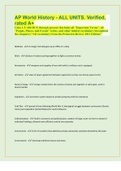
-
AP World History - ALL UNITS. Verified, rated A+ Units 1-5: 600 BCE through present {Includes all "Important Terms", all "People, Places, and Events" terms, and other bolded vocabulary throughout the chapters} *All vocabulary from the Princeto
- Exam (elaborations) • 66 pages • 2023
-
Available in package deal
-
- $11.49
- + learn more
AP World History - ALL UNITS. Verified, rated A+ Units 1-5: 600 BCE through present {Includes all "Important Terms", all "People, Places, and Events" terms, and other bolded vocabulary throughout the chapters} *All vocabulary from the Princeton Review 2011 Edition* Abdicate - -to resign; formally give up an office or a duty Allies - -alliance of nations joining together to fight a common enemy Armaments - -weapons and supplies of war with which a military unit is equipped Armi...
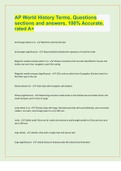
-
AP World History Terms, Questions sections and answers, 100% Accurate, rated A+
- Exam (elaborations) • 7 pages • 2023
-
Available in package deal
-
- $9.49
- + learn more
AP World History Terms, Questions sections and answers, 100% Accurate, rated A+ Anchorages (what it is) - -Maritime commercial hubs Anchorages (significance) - -Exponentially facilitated the expansion of maritime trade Magnetic needle compass (what it is) - -Chinese inventions that accurate identified for houses and tombs, but over time, navigators used it for sailing Magnetic needle compass (significance) - -11th century sailors from Guangzhou (Canton) used it to find their way to...
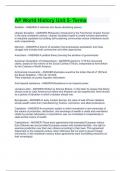
-
AP World History Unit 5- Terms
- Exam (elaborations) • 10 pages • 2024
- Available in package deal
-
- $10.99
- + learn more
AP World History Unit 5- Terms
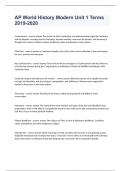
-
AP World History Modern Unit 1 Terms questions and answers verified 2024
- Exam (elaborations) • 6 pages • 2024
- Available in package deal
-
- $12.49
- + learn more
AP World History Modern Unit 1 Terms questions and answers verified 2024
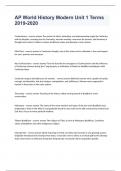
-
AP World History Modern Unit 1 Terms 2019-2020 updated to pass
- Exam (elaborations) • 6 pages • 2023
- Available in package deal
-
- $11.49
- + learn more
AP World History Modern Unit 1 Terms Confucianism - correct answer The system of ethics, education, and statesmanship taught by Confucius and his disciples, stressing love for humanity, ancestor worship, reverence for parents, and harmony in thought and conduct. Made to restore traditional values and develop a caste system. Filial Piety - correct answer In Confucian thought, one of the virtues to be cultivated, a love and respect for one's parents and ancestors. Neo-Confucianism - correct...
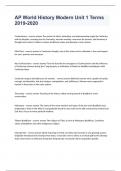
-
AP World History Modern Unit 1 Terms 2023-2024
- Exam (elaborations) • 6 pages • 2024
- Available in package deal
-
- $13.49
- + learn more
AP World History Modern Unit 1 Terms
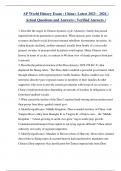
-
AP World History Exam : China ( Latest 2023 – 2024 ) Actual Questions and Answers ( Verified Answers )
- Exam (elaborations) • 13 pages • 2023
-
Available in package deal
-
- $8.99
- + learn more
AP World History Exam : China ( Latest 2023 – 2024 ) Actual Questions and Answers ( Verified Answers ) 1. Describe the stages in Chinese dynastic cycle. (dynasty): family that passed imperial title from generation to generation. When dynasty grew weaker & tax revenues declined>social divisions>internal rebellions &sometimes invasions. As ruling dynasty declined, another emerged, usually from family of a successful general, invader, or peasant rebel & pattern would repeat. Many ...
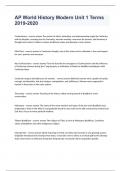
-
AP World History Modern Unit 1 Terms 2019-2020 updated to pass
- Exam (elaborations) • 6 pages • 2023
-
Available in package deal
-
- $11.49
- + learn more
AP World History Modern Unit 1 Terms Confucianism - correct answer The system of ethics, education, and statesmanship taught by Confucius and his disciples, stressing love for humanity, ancestor worship, reverence for parents, and harmony in thought and conduct. Made to restore traditional values and develop a caste system. Filial Piety - correct answer In Confucian thought, one of the virtues to be cultivated, a love and respect for one's parents and ancestors. Neo-Confucianism - corre...
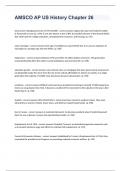
-
AMSCO AP US History Chapter 26 question well answered 2023/2024
- Exam (elaborations) • 8 pages • 2023
- Available in package deal
-
- $15.49
- + learn more
AMSCO AP US History Chapter 26Servicemen's Readjustment Act of 1944 (GI Bill) - correct answers Signed into law by President Franklin D. Roosevelt on June 22, 1944, it was also known as the GI Bill. It provided veterans of the Second World War with funds for college education, unemployment insurance, and housing. (p. 557) early marriages - correct answers One sign of confidence in post-World War II era was an explosion of marriages at a younger age and new births. (p. 558) baby boom - cor...

Study stress? For sellers on Stuvia, these are actually golden times. KA-CHING! Earn from your study resources too and start uploading now. Discover all about earning on Stuvia


